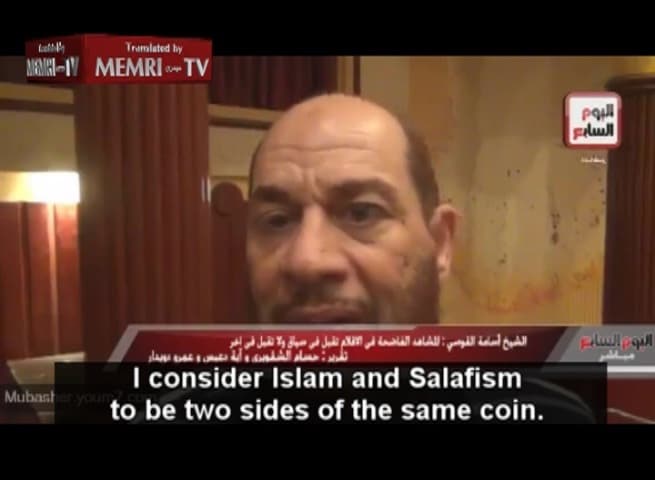Following are excerpts from an interview with Egyptian Salafi Sheik Osama El Qusy, at a Christian film festival. The interview was posted on the Internet on May 30, 2012.
Osama El Qusy: "I am here in order to demonstrate the tolerance of Islam and of Salafism. I consider Islam and Salafism to be two sides of the same coin. The allegations that Islam is extremist and that Salafism is backward are as far as can be from the truth." [...]
Interviewer: "In films that are being screened these days, one sees all kinds of scenes that might contradict religious values. What is your view on this?"
Osama El Qusy: "Let me give you a more general answer. Actions should be judged according to intentions. There are people who want to reform and people who want to corrupt. If we were to interpret everything as contradicting moral values, we would be forced to accuse even the Koran itself of this, for example, in the story of Joseph [and Potiphar's wife], where it says: 'But she in whose house he was sought to seduce him from his self. She fastened the doors and said: Now come, thou [dear one]!' People whose minds are focused on urges would start thinking: What was she wearing? What was she doing? Our Lord Himself tells us this story. It's something that really happened. 'And [with passion] did she desire him, and he would have desired her.'
"The same is true of the story of King Solomon. When the Queen of Sheba entered the room, 'she thought it was a lake of water, and uncovered her legs.' That's what our Lord says. We start thinking what her legs looked like...
"The question here is what the main purpose of the literary work is. Some people consider Naguib Mahfouz's literature to be pornographic, for example, even though the man was a reformer, and all his works call for social reform. [Through art], one can expose the flaws of society, and then begin to address them."
SUPPORT OUR WORK

Interviewer: "But some cinematic scenes include offensive promiscuity. There is a difference between images and words. What is your view on the promiscuity that may exist in such films?"
Osama El Qusy: "There is no doubt that different forms of art correspond to different societies. Therefore, Indian films, for example, differ from American films. Every society has its own customs, traditions, and moral values, and this is reflected in its art. Something may be unacceptable at some point and acceptable at another point.
"Let me give you another example. [Let's say] I am a doctor, studying to be a surgeon, and I have a book full of pictures of nudity. Is it my goal to look at naked pictures or to study to become a surgeon? If I am an obstetrician, is it my goal to deliver a living being from this woman or to look at her nudity?
"Anything that helps the development of human culture and of Man should not be considered promiscuity, unless we are talking about full-fledged pornographic films. Let's take a film with a dramatic plot that unfolds from beginning to end, which discusses a certain social phenomenon, and may or may not portray a solution to the phenomenon, but ultimately, the purpose of the film is reform. If in the middle of this film, there are..."
Interviewer: "Some promiscuous scenes..."
Osama El Qusy: "I'm not talking about promiscuity, but about scenes that might be perceived as shameful. Undoubtedly, they are legitimate in some contexts and illegitimate in others."
Interviewer: "Do the Salafis accept the cinema as it is today, with its ideas and its freedom?"
Osama El Qusy: "When the Salafis entered the political fray, they accepted many things that they opposed in the past. But I am different from them. I do not belong to any Salafi organization, but I subscribe to the Salafi ideology, principles, and values. I am totally different from the organized Salafis. Perhaps I was like them 20 years ago, but Allah be praised, with time, I have gained a broader, deeper, and more comprehensive understanding of religion, and I have freed myself from the shackles that continue to bind others." [...]






